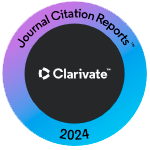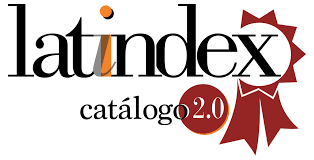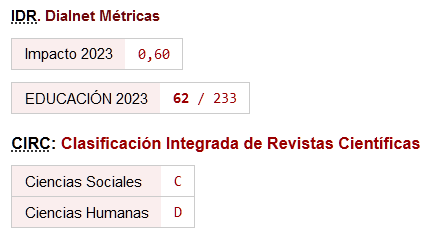Conocimiento, percepción y actitudes de las enfermeras investigadoras filipinas hacia ChatGPT y su productividad investigadora
un estudio de correlación descriptivo
DOI:
https://doi.org/10.46661/ijeri.10568Palabras clave:
ChatGPT, productividad de la investigación, enfermeras investigadoras, FilipinasResumen
El estudio describe los conocimientos, la percepción y las actitudes de las enfermeras filipinas investigadoras hacia ChatGPT y la productividad de la investigación. Utilizando un diseño descriptivo correlacional, se enviaron cuestionarios de elaboración propia, validados y pilotados a trescientas setenta enfermeras filipinas investigadoras, tanto noveles (<5 años de experiencia en investigación) como experimentadas (>10 años de experiencia). Se utilizaron estadísticas descriptivas para las características del perfil, mientras que para identificar diferencias significativas entre los dos grupos de participantes en KPA y productividad investigadora se utilizó una prueba t de muestras independientes. La correlación producto-momento de Pearson y un análisis de regresión lineal estándar examinaron la relación entre las variables independientes (KPA) y dependientes (productividad investigadora). El nivel de significación estadística se fijó en p < 0,05. El grupo de participantes más numeroso estaba formado por enfermeras filipinas investigadoras de entre 20 y 30 años con un máster en enfermería. Declararon tener menos de 10 años de experiencia como instructoras y haber publicado entre 1 y 5 artículos de investigación. Las puntuaciones KPA indicaban una comprensión general de las capacidades de ChatGPT como herramienta valiosa para la investigación y una actitud positiva hacia su uso. Los resultados del estudio revelaron además que la prueba t no mostró una diferencia estadísticamente significativa en percepción (t=1,28, p=0,20) y productividad investigadora (t=1,28, p=0,20). Pero los conocimientos (t=4,73, p=0,00) y la actitud (t=1,28,p=0,02) sí resultaron significativos. Un análisis más detallado reveló una R-cuadrado ajustada de 0,145, lo que indica que las variables independientes (conocimiento, percepción y actitud) pueden explicar aproximadamente el 14,5% de la varianza de la productividad investigadora. Se encontró una correlación positiva estadísticamente significativa entre las actitudes hacia ChatGPT y la productividad de la investigación (β = 0,141, p = 0,012). En este estudio participaron instructoras de entre 20 y 30 años, con máster en Enfermería y menos de 10 años de experiencia. Declararon tener entre 1 y 5 publicaciones, lo que sugiere una actividad investigadora moderada. Aunque los resultados revelaron una comprensión general del potencial de ChatGPT para la investigación, los participantes dudaron en integrar su uso debido a preocupaciones éticas, que necesitan más educación sobre el uso responsable de ChatGPT en la investigación. Además, los resultados del estudio sugieren que las enfermeras filipinas investigadoras que están más abiertas a utilizar ChatGPT tienden a demostrar una mayor producción investigadora.
Descargas
Citas
Abdaljaleel, M., Barakat, M., Alsanafi, M., Salim, N. A., Abazid, H., Malaeb, D., Mohammed, A. H., Hassan, B. A. R., Wayyes, A. M., Farhan, S. S., Khatib, S. E., Rahal, M., Sahban, A., Abdelaziz, D. H., Mansour, N. O., AlZayer, R., Khalil, R., Fekih-Romdhane, F., Hallit, R., Hallit, S., & Sallam, M. (2024). A multinational study on the factors influencing university students’ attitudes and usage of ChatGPT. Scientific Reports (Nature Publisher Group), 14(1), 1983. https://doi.org/10.1038/s41598-024-52549-8
Abdelhafiz, A. S., Ali, A., Maaly, A. M., Ziady, H. H., Sultan, E. A., & Mahgoub, M. A. (2024). Knowledge, Perceptions and Attitude of Researchers Towards Using ChatGPT in Research. Journal of Medical Systems, 48(1), 26. https://doi.org/https://doi.org/10.1007/s10916-024-02044-4
Albayati, H. (2024). Investigating undergraduate students' perceptions and awareness of using ChatGPT as a regular assistance tool: A user acceptance perspective study. Computers and Education: Artificial Intelligence, 6, 100203. https://doi.org/10.1016/j.caeai.2024.100203
Baidoo-Anu, D., & Ansah, L. O. (2023). Education in the era of generative artificial intelligence (AI): Understanding the potential benefits of ChatGPT in promoting teaching and learning. Journal of AI, 7(1), 52-62. https://doi.org/10.61969/jai.1337500
Bohr, A., & Memarzadeh, K. (2020). The rise of artificial intelligence in healthcare applications. In Artificial Intelligence in healthcare (pp. 25-60). Elsevier. https://doi.org/10.1016/B978-0-12-818438-7.00002-2
Cao, Y., Li, S., Liu, Y., Yan, Z., Dai, Y., Yu, P. S., & Sun, L. (2023). A comprehensive survey of ai-generated content (aigc): A history of generative ai from gan to chatgpt. Online information review, 37(5), 583-603. https://doi.org/10.48550/arXiv.2303.04226
Chan, C. K. Y., & Hu, W. (2023). Students’ voices on generative AI: perceptions, benefits, and challenges in higher education: Revista de Universidad y Sociedad del Conocimiento. International Journal of Educational Technology in Higher Education, 20(1), 43. https://doi.org/10.1186/s41239-023-00411-8
Chukwuere, J. E. (2024). Today's academic research: The role of ChatGPT writing. Journal of Information Systems and Informatics, 6(1), 30-46. https://doi.org/10.51519/journalisi.v6i1.639
Committee on the Robert Wood Johnson Foundation Initiative on the Future of Nursing, at the IOM. (2011). The future of nursing: Leading change, advancing health. National Academies Press.
Dergaa, I., Chamari, K., Zmijewski, P., & Saad, H. B. (2023). From human writing to artificial intelligence generated text: examining the prospects and potential threats of ChatGPT in academic writing. Biology of sport, 40(2), 615-622. https://doi.org/10.5114/biolsport.2023.125623
Dwivedi, Y. K., Kshetri, N., Hughes, L., Slade, E. L., Jeyaraj, A., Kar, A. K., Baabdullah, A. M., Koohang, A., Raghavan, V., & Ahuja, M. (2023). “So what if ChatGPT wrote it?” Multidisciplinary perspectives on opportunities, challenges and implications of generative conversational AI for research, practice and policy. International Journal of Information Management, 71, 102642. https://doi.org/10.1016/j.ijinfomgt.2023.102642
Frieder, S., Pinchetti, L., Griffiths, R.-R., Salvatori, T., Lukasiewicz, T., Petersen, P., & Berner, J. (2024). Mathematical capabilities of chatgpt. Advances in Neural Information Processing Systems, 36. https://doi.org/10.48550/arXiv.2301.13867
Fuchs, K. (2023). Exploring the opportunities and challenges of NLP models in higher education: is Chat GPT a blessing or a curse? Frontiers in Education,8, https://doi.org/10.3389/feduc.2023.1166682
Fuller, K. A., Morbitzer, K. A., Zeeman, J. M., Persky, A. M., Savage, A. C., & McLaughlin, J. E. (2024). Exploring the use of ChatGPT to analyze student course evaluation comments. BMC Medical Education, 24, 1-8. https://doi.org/10.1186/s12909-024-05316-2
George, A. S., & George, A. H. (2023). A review of ChatGPT AI's impact on several business sectors. Partners Universal International Innovation Journal, 1(1), 9-23. https://doi.org/10.5281/zenodo.7644359
Guo, Y., Hao, Z., Zhao, S., Gong, J., & Yang, F. (2020). Artificial intelligence in health care: bibliometric analysis. Journal of medical Internet research, 22(7), e18228. https://doi.org/10.2196/18228
Haleem, A., Javaid, M., & Singh, R. P. (2022). An era of ChatGPT as a significant futuristic support tool: A study on features, abilities, and challenges. BenchCouncil transactions on benchmarks, standards and evaluations, 2(4), 100089. https://doi.org/10.1016/j.tbench.2023.100089
Hosseini, M., Gao, C. A., Liebovitz, D. M., Carvalho, A. M., Ahmad, F. S., Luo, Y., MacDonald, N., Holmes, K. L., & Kho, A. (2023). An exploratory survey about using ChatGPT in education, healthcare, and research. Plos One, 18(10). https://doi.org/https://doi.org/10.1371/journal.pone.0292216
Huh, S. (2023). Ethical consideration of the use of generative artificial intelligence, including ChatGPT in writing a nursing article. Child Health Nursing Research, 29(4), 249-251. https://doi.org/10.4094/chnr.2023.29.4.249
Khlaif, Z. N., Mousa, A., Hattab, M. K., Itmazi, J., Hassan, A. A., Sanmugam, M., & Ayyoub, A. (2023). The potential and concerns of using AI in scientific research: ChatGPT performance evaluation. JMIR Medical Education, 9, e47049. https://doi.org/10.2196/47049
Kocoń, J., Cichecki, I., Kaszyca, O., Kochanek, M., Szydło, D., Baran, J., Bielaniewicz, J., Gruza, M., Janz, A., & Kanclerz, K. (2023). ChatGPT: Jack of all trades, master of none. Information Fusion, 99, 101861. https://doi.org/10.1016/j.inffus.2023.101861
Lund, B. D., & Wang, T. (2023). Chatting about ChatGPT: how may AI and GPT impact academia and libraries? Library hi tech news, 40(3), 26-29. https://doi.org/10.1108/LHTN-01-2023-0009
Nakavachara, V., Potipiti, T., & Chaiwat, T. (2024). Experimenting with Generative AI: Does ChatGPT Really Increase Everyone's Productivity? Artificial Intelligence in healthcare. https://doi.org/10.48550/arXiv.2403.01770
Raman, R., Mandal, S., Das, P., Kaur, T., Sanjanasri, J., & Nedungadi, P. (2023). University students as early adopters of ChatGPT: Innovation Diffusion Study. https://doi.org/10.21203/rs.3.rs-2734142/v1
Raosoft, I. (2004). Sample size calculator. In http://www.raosoft.com/samplesize.html
Renjith, G. P., Kyaw Soe Htoo, H., Donald Preethy, M., Samson, R. S., & Hj Ismail Abdul, R. (2024). ChatGPT for Academic Purposes: Survey Among Undergraduate Healthcare Students in Malaysia. Cureus, 16(1). https://doi.org/https://doi.org/10.7759/cureus.53032
Rice, S., Crouse, S. R., Winter, S. R., & Rice, C. (2024). The advantages and limitations of using ChatGPT to enhance technological research. Technology in Society, 76, 102426. https://doi.org/10.1016/j.techsoc.2023.102426
Sallam, M., Salim, N. A., Barakat, M., Al-Mahzoum, K., Al-Tammemi, A. a. B., Malaeb, D., Hallit, R., & Hallit, S. (2023). Assessing Health Students' Attitudes and Usage of ChatGPT in Jordan: Validation Study. JMIR Medical Education, 9, 1. https://doi.org/https://doi.org/10.2196/48254
Stahl, B. C., & Eke, D. (2024). The ethics of ChatGPT–Exploring the ethical issues of an emerging technology. International Journal of Information Management, 74, 102700. https://doi.org/10.1016/j.ijinfomgt.2023.102700
Thi Thuy An, N. (2023). The Perception by University Students of the Use of ChatGPT in Education. International Journal of Emerging Technologies in Learning (Online), 18(17), 4-19. https://doi.org/10.3991/ijet.v18i17.39019
van Dis, E. A., Bollen, J., Zuidema, W., Van Rooij, R., & Bockting, C. L. (2023). ChatGPT: five priorities for research. Nature, 614(7947), 224-226. https://doi.org/10.1038/d41586-023-00288-7
Whitford, E. (2022). A Computer Can Now Write Your College Essay, Maybe Better Than You Can. Forbes com.
Wu, T., He, S., Liu, J., Sun, S., Liu, K., Han, Q.-L., & Tang, Y. (2023). A brief overview of ChatGPT: The history, status quo and potential future development. IEEE/CAA Journal of Automatica Sinica, 10(5), 1122-1136. https://doi.org/10.1109/JAS.2023.123618
Yenduri, G., Ramalingam, M., Selvi, G. C., Supriya, Y., Srivastava, G., Maddikunta, P. K. R., Raj, G. D., Jhaveri, R. H., Prabadevi, B., & Wang, W. (2024). Gpt (generative pre-trained transformer)–a comprehensive review on enabling technologies, potential applications, emerging challenges, and future directions. IEEE Access. https://doi.org/10.1109/ACCESS.2024.3389497
Zhang, M., & Li, J. (2021). A commentary of GPT-3 in MIT Technology Review 2021. Fundamental Research, 1(6), 831-833. https://doi.org/10.1016/j.fmre.2021.11.011
Descargas
Publicado
Cómo citar
Número
Sección
Licencia
Derechos de autor 2024 Cyruz P. Tuppal, Marina Magnolia G. Nnobla, Richard D. Loresco, Mara R. Cabradilla, Shanine Mae P. Tuppal, Leah Kalayaan A. Pellacouer, Mary Nellie T. Roa, Judith Mary Ann R. Chan, Iril I. Panes, Anna Libabel U. Ferreras

Esta obra está bajo una licencia internacional Creative Commons Atribución-NoComercial-SinDerivadas 4.0.











